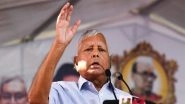New Delhi [India], December 19 (ANI): The Reserve Bank of India (RBI) on Thursday termed increasing spending by states on subsidies as an "incipient stress" and called for rationalisation of such outgoes.
The central bank in a report 'State Finances: A Study of Budgets of 2024-25' said that the states need to contain and rationalise their subsidy outgoes so that such spending does not crowd out more productive expenditure.
Subsidies provided by the states include farm loan waivers, free/subsidised services (like electricity to agriculture and households, transport, gas cylinders) and cash transfers to farmers, youth and women.
Subsidies, sometimes termed freebies in political discourse, are being resorted by political parties, specially ahead of polls.
Several states have announced sops pertaining to farm loan waivers, free electricity to agriculture and households, free transport to a section of people, allowances to unemployed youth and monetary assistance to women.
"Such spending could crowd out the resources available to them and hamper their capacity to build critical social and economic infrastructure. High debt-GDP ratio, outstanding guarantees and the increasing subsidy burden require states to persevere with fiscal consolidation while laying greater emphasis on developmental and capital spending," the RBI report read.
RBI argued that an urgent review of the outgoes on subsidies is warranted to free up resources for increased investment in health, education, agriculture, research and development (R&D) and rural infrastructure, which will help create more jobs and reduce poverty on a sustainable basis.
Asserting that new pressures are emerging from an increasing subsidy burden, RBI said these developments underline the need for deepening fiscal consolidation by the states.
On a macro level, RBI said state governments have made commendable progress towards fiscal consolidation by containing their aggregate gross fiscal deficit within 3 per cent of GDP for three consecutive years (2021-22 to 2023-24) and restricting revenue deficit to 0.2 per cent of GDP in 2022- 23 and 2023-24.
This, RBI said, has allowed the states to scale up their capital spending and improve the quality of expenditure.
The adoption of fiscal responsibility legislations (FRLs) by state governments in the early 2000s improved their key fiscal parameters.
Concomitantly, the overall debt of the states declined from 31.8 per cent of GDP at end-March 2004 to 28.5 per cent of GDP at end-March 2024; however, it remains well above the level of 20 per cent recommended by the Fiscal Responsibility and Budget Management (FRBM) Review Committee (2017).
The RBI report suggested data analytics, the adoption of machine learning and artificial intelligence can help states further refine their taxation systems and augment tax capacity.
It added that states can also increase non-tax revenue by timely revisions of user charges, particularly for power, water and transport services. (ANI)
(The above story is verified and authored by ANI staff, ANI is South Asia's leading multimedia news agency with over 100 bureaus in India, South Asia and across the globe. ANI brings the latest news on Politics and Current Affairs in India & around the World, Sports, Health, Fitness, Entertainment, & News. The views appearing in the above post do not reflect the opinions of LatestLY)













 Quickly
Quickly


